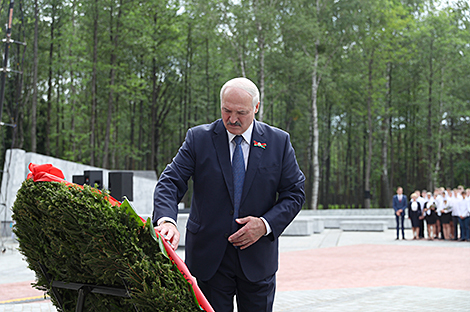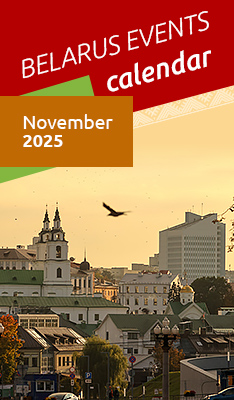News & Events in Belarus
Lukashenko: Belarus will not allow Nazism ideas to be reborn

SVETLOGORSK DISTRICT, 21 June (BelTA) – Belarus President Aleksandr Lukashenko took part in a ceremony on 21 June to open the memorial complex Ola at the site of the village of Ola, which was burned down by the Nazi during World War Two, BelTA has learned.
During the ceremony Aleksandr Lukashenko said: “Belarus will never allow the rebirth of Nazism ideas in its land. Belarus will never allow the history to be rewritten and the memory of the winners, who saved the world from butchers, to be betrayed. There can be no forgiveness for atrocities.”
Aleksandr Lukashenko noted that pain still lingers in people’s hearts but the bitter truth is that soul scars get healed and emotions get tamed with the passage of time. “People tend to gradually forget things. Even the things that one shouldn’t forget if we don’t remind them about it. Such monuments will serve as a reminder for our children, grandchildren, and all those, who will live after us,” he said.
Aleksandr Lukashenko stated that years later it will be harder and harder for every new generation to recognize the hardships and trials their ancestors endured, it will be hard to imagine the cruelty and the ease the Nazi demonstrated as they took people’s lives, it will be hard to believe in the genuine readiness of people to die for their country.
Aleksandr Lukashenko noted: “But these things happened. Khatyn, Krasny Bereg, Trostenets, the Pit, Borki, Ola, communal graves, and every square meter of our land present silent testimony of the Nazi crimes. They keep the truth. It is our sacred duty to preserve it and pass it on to the future generations.”








Aleksandr Lukashenko is convinced that as long as people come here, bring their daughters and sons here, Belarus will never forget how kids were dying in their parents’ arms, how helpless old people were set ablaze.
“When I entered this street, the street of a dead village, those, who welcomed me, thanked me for assistance with the construction of this great monument. It is not my accomplishment. As the president I had to touch this monument. It was accomplished by Gomel residents, residents of Svetlogorsk, residents of villages. You created this monument with your own hands,” the Belarusian leader stressed.
Aleksandr Lukashenko thanked everyone, who had taken part in the reconstruction of the memorial, including young Belarusians, thanks to whom this initiative had become national. He thanked everyone, who joined in the initiative by participating in a traditional national cleanup day this spring. “We demonstrated that young Belarusians can do something else than use their gadgets, shout in streets of the beautiful and cozy city of Minsk. That our young people can accomplish such sacred deeds,” Aleksandr Lukashenko said. “You and I have yet to accomplish a lot. There are many places in Belarus with a tragic history, which have not been immortalized as a memorial yet. We have a lot of heroic stories worthy of a monument.”
“While someone in the world prefers forgetting dreadful pages of World War Two, while someone tries to shift focus in matters of responsibility of the countries, Belarus keeps the true history in stone,” the president stated.
“May they come and see, may they appreciate this holy nation, which sometimes fought in someone else’s wars. But it always fought for honor and justice. We did it for the sake of our future. So that our children, grandchildren, every new generation would understand the true meaning of freedom and independence, would appreciate life and treasure peace,” Aleksandr Lukashenko concluded.
When he was in Borki the day before, Aleksandr Lukashenko noted that he had never thought that he would have to talk about the need to defend sovereignty quarter of a century later in the peaceful and independent Belarus. “Don’t relax. Remember that there are still many people around us, who will definitely try to meddle in our affairs due to envy, due to their dislike of our nation, due to our talking about our independence and our pursuing of an independent policy. We will allow no one to make us slaves once again,” Aleksandr Lukashenko said.
The German army occupied the village of Ola in late July 1941. In the morning of 14 January 1944 a German punitive force assisted by an army unit of about 1,000 troops surrounded the village. People were herded into the houses, which were then set ablaze. Those trying to run away were gunned down and were dragged into the fire while they were still alive. As many as 1,758 civilians were shot and burned like that, including 950 kids. The village of Ola was not revived after the war. In 1958 a monument – a kneeling soldier with a wreath – was erected at the communal grave where the civilians and Soviet soldiers are buried (a total of 2,253 people).
The communal grave has been reconstructed to create the memorial complex Ola. It includes three functional zones: an entrance zone, a commemorative zone (in the area adjacent to the existing communal grave) and a footpath to connect the two zones along a former village street. A symbolic cross and a bell have been placed in the center of the commemorative zone. There is a string of bells nearby. The bell tower was made to look like a village barn and contains a number of bells to match the number of villages, whose residents died there.







 print version
print version make home page
make home page add to bookmarks
add to bookmarks

